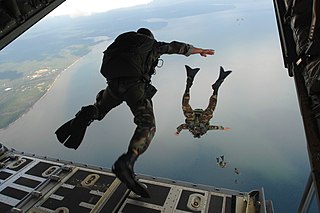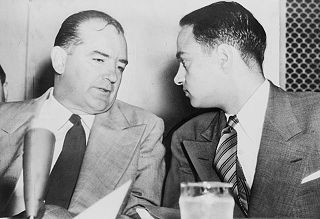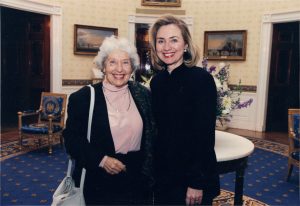Related Research Articles

"Don't ask, don't tell" (DADT) was the official United States policy on military service of non-heterosexual people. Instituted during the Clinton administration, the policy was issued under Department of Defense Directive 1304.26 on December 21, 1993, and was in effect from February 28, 1994, until September 20, 2011. The policy prohibited military personnel from discriminating against or harassing closeted homosexual or bisexual service members or applicants, while barring openly gay, lesbian, or bisexual persons from military service. This relaxation of legal restrictions on service by gays and lesbians in the armed forces was mandated by Public Law 103–160, which was signed November 30, 1993. The policy prohibited people who "demonstrate a propensity or intent to engage in homosexual acts" from serving in the armed forces of the United States, because their presence "would create an unacceptable risk to the high standards of morale, good order and discipline, and unit cohesion that are the essence of military capability".

An airman is a member of an air force or air arm of a nation's armed forces. In certain air forces, it can also refer to a specific enlisted rank. An airman can also be referred as a soldier in other definitions.
The chart below represents the current enlisted rank insignia of the United States Air Force.

A military discharge is given when a member of the armed forces is released from their obligation to serve. Each country's military has different types of discharge. They are generally based on whether the persons completed their training and then fully and satisfactorily completed their term of service. Other types of discharge are based on factors such as the quality of their service, whether their service had to be ended prematurely due to humanitarian or medical reasons, whether they had been found to have drug or alcohol dependency issues and whether they were complying with treatment and counseling, and whether they had demerits or punishments for infractions or were convicted of any crimes. These factors affect whether they will be asked or allowed to re-enlist and whether they qualify for benefits after their discharge.
An exchange is a type of retail store found on United States military installations worldwide. Originally akin to trading posts, they now resemble contemporary department stores or strip malls. Exact terminology varies by armed service; some examples include base exchange (BX), and post exchange (PX), and there are more specific terms for subtypes of exchange.
The DD Form 214, Certificate of Release or Discharge from Active Duty, generally referred to as a "DD 214", is a document of the United States Department of Defense, issued upon a military service member's retirement, separation, or discharge from active duty in the Armed Forces of the United States.

Technical Sergeant Leonard Phillip Matlovich was an American Vietnam War veteran, race relations instructor, and recipient of the Purple Heart and the Bronze Star. He was the first gay service member to purposely out himself to the military to fight their ban on gays, and perhaps the best-known openly gay man in the United States of America in the 1970s next to Harvey Milk. His fight to stay in the United States Air Force after coming out of the closet became a cause célèbre around which the gay community rallied. His case resulted in articles in newspapers and magazines throughout the country, numerous television interviews, and a television movie on NBC. His photograph appeared on the cover of the September 8, 1975, issue of Time magazine, making him a symbol for thousands of gay and lesbian servicemembers and gay people generally. Matlovich was the first named openly gay person to appear on the cover of a U.S. newsmagazine. According to author Randy Shilts, "It marked the first time the young gay movement had made the cover of a major newsweekly. To a movement still struggling for legitimacy, the event was a major turning point."

The Lavender Scare was a moral panic about homosexual people in the United States government which led to their mass dismissal from government service during the mid-20th century. It contributed to and paralleled the anti-communist campaign which is known as McCarthyism and the Second Red Scare. Gay men and lesbians were said to be national security risks and communist sympathizers, which led to the call to remove them from state employment. It was thought that gay people were more susceptible to being manipulated, which could pose a threat to the country. Lesbians were at less risk of persecution than gay men, but some lesbians were interrogated or lost their jobs.
A blue discharge, also called blue ticket, was a form of administrative military discharge formerly issued by the United States beginning in 1916. It was neither honorable nor dishonorable. The blue ticket became the discharge of choice for commanders seeking to remove homosexual service members from the ranks. They were also issued disproportionately to African Americans.
The United States military formerly excluded gay men, bisexuals, and lesbians from service. In 1993, the United States Congress passed, and President Bill Clinton signed, a law instituting the policy commonly referred to as "Don't ask, don't tell" (DADT), which allowed gay, lesbian, and bisexual people to serve as long as they did not reveal their sexual orientation. Although there were isolated instances in which service personnel were met with limited success through lawsuits, efforts to end the ban on openly gay, lesbian, and bisexual people serving either legislatively or through the courts initially proved unsuccessful.

Witt v. Department of the Air Force, 527 F.3d 806 is a federal lawsuit that challenged the constitutionality of 10 U.S.C. § 654, the law, since repealed, that excluded openly homosexual people from serving in the United States military, commonly known as "Don't ask, don't tell" (DADT). The United States Court of Appeals for the Ninth Circuit ruled in 2008 that under Lawrence v. Texas DADT constitutes an "[attempt] to intrude upon the personal and private lives of homosexuals" and it is subject to "heightened scrutiny", meaning that the government "must advance an important governmental interest, the intrusion must significantly further that interest, and the intrusion must be necessary to further that interest."

Airman first class (A1C) is the third enlisted rank in the United States Air Force, just above airman and below senior airman. The rank of airman first class is considered a junior enlisted rank, with the non-commissioned officers and senior non-commissioned officers above it.

Miriam Ben-Shalom is an American educator, activist and former Staff Sergeant in the United States Army. After being discharged from the military for homosexuality in 1976, she successfully challenged her discharge in court and returned to military service in 1987—the first openly gay person to be reinstated after being discharged under the military's policy excluding homosexuals from military service. She served until 1990 when the Army succeeded in terminating her service after prolonged judicial proceedings.

There have been women in the United States Air Force since 1948, and women continue to serve in it today.
Melvin Dwork was an American interior designer and LGBT activist. He was discharged from the United States Navy in World War II for his homosexuality. He eventually had his dishonorable discharge changed to honorable in 2011. Following the war, he studied design and won several awards.
Joe L. Hayes Jr. is an American businessman and politician. From Fairbanks, Alaska, he was elected to the Alaska House of Representatives in November 2000. He was the only African American in the Alaska House during his term. A distinguished alumnus of the University of Alaska Fairbanks, he was elected student body president and as a student appointed by the Alaska Governor to the Statewide University of Alaska board of regents. Hayes worked for a decade as executive director of the UAF Alumni Association.

In the past most lesbian, gay, bisexual, transgender, and queer (LGBTQ) personnel had major restrictions placed on them in terms of service in the United States military. As of 2010 sexual orientation and gender identity in the United States military varies greatly as the United States Armed Forces have become increasingly openly diverse in the regards of LGBTQ people and acceptance towards them.

June Adele Willenz was an American military veterans advocate, Executive Director of the American Veterans Committee (AVC), and author of Women Veterans: America's Forgotten Heroines. Willenz also initiated the effort to build the Women in Military Service for America Memorial at Arlington National Cemetery. She was inducted into the Maryland Women's Hall of Fame in 2011.
Harry Thaddeus Stewart Jr. is a retired United States Army Air Forces officer, a Distinguished Flying Cross recipient, and a fighter pilot who served in the 332nd Fighter Group, best known as the all-African American Tuskegee Airmen.
Granville C. Coggs was an American medical doctor, radiologist, U.S. Army Air Force/U.S. Air Force/U.S. Air Force Reserves officer, and trained bombardier pilot with the 477th Bombardment Group attached to the famed Tuskegee Airmen. He was one of the 1007 documented Tuskegee Airmen Pilots.
References
- ↑ "Helen G. James Collection - Legal Documents - Discharge Lawsuit | Smithsonian Digital Volunteers". transcription.si.edu. Retrieved 2022-06-01.
- 1 2 "An Honor Taken, Now Restored". Air & Space Magazine. Retrieved 2019-10-08.
- ↑ "Lesbian veteran, 90, expelled from Air Force in '55, finally gets her 'honorable discharge'". Nbcnews.com. 2018-01-18. Retrieved 2020-03-09.
- 1 2 3 4 5 6 Williams, Patti (27 June 2018). "Helen James' Fight for Equality in the Military". airandspace.si.edu. Retrieved 2022-12-22.
- 1 2 Swenson, Kyle (18 January 2018). "The Air Force expelled her in 1955 for being a lesbian. Now, at 90, she's getting an honorable discharge". Washington Post. ISSN 0190-8286 . Retrieved 2022-12-22.
- ↑ "Viewing page 3 of 30 for project 36902 | Smithsonian Digital Volunteers". transcription.si.edu. Retrieved 2024-01-27.
- ↑ "Lesbian veteran, 90, expelled from Air Force in '55, finally gets her 'honorable discharge'". NBC News. Retrieved 2019-10-08.
- ↑ "Viewing page 5 of 30 for project 36902 | Smithsonian Digital Volunteers". transcription.si.edu. Retrieved 2024-01-28.
- 1 2 "Helen G. James Collection". Smithsonian Online Virtual Archive. Smithsonian Institution. Retrieved 8 October 2019.
- ↑ "Viewing page 6 of 30 for project 36902 | Smithsonian Digital Volunteers". transcription.si.edu. Retrieved 2024-01-28.